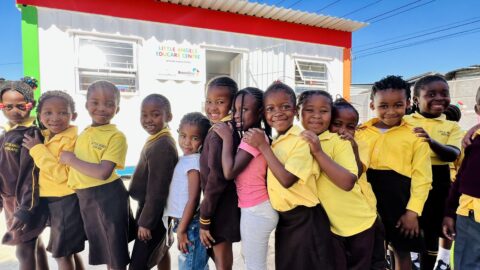Business Day Human Rights Day
Climate Adaption Requires People To Pull Together
The struggle to address human rights, socioeconomic, climate and environmental justice should, can and must be seen as two sides of the same coin. A sentiment voiced by Kumi Naidoo, founding chair at africans rising for justice, peace and dignity and former secretary general of amnesty international and executive director of greenpeace international. “for me, one of the historical failings of the environmental movement was not ensuring that there was a human-centric approach to environmental activism.”
Activism is essentially an expression by people saying they refuse to accept that the status of the world or their own circumstances are the best that humanity can offer. “It’s an act of refusal to accept that they have to settle for the level of injustice and inefficiency they experience every day,” says Naidoo. “It’s also a declaration of love for humanity, sustainability and wanting to improve the world we live in, which can be expressed on many levels.” He says that on a macro level, activism is activity that changes governance, like the overthrow of apartheid or the democratisation of the World Bank. On a mid level, it involves trying to influence policy, like one that would encourage people to treat water as a precious resource or to use energy-efficient light bulbs. On a micro level, it involves the provision of direct services to people in need.
Not serving the people
Naidoo’s opinion that current human rights systems are not delivering the level of rights people should be receiving is easy to agree with, in the face of continuing global levels of poverty and inequality. “Look at the Vrede Dairy Project corruption – the money stolen there could have electrified every village in the Free State through mini solar grids and taken all of those people out of energy poverty,” he says. “That’s a denial of rights on a constitutional level. The fact that government hasn’t got its act together is a reflection of a lack of vision and an over-reliance on massive infrastructure projects that are ripe for corruption and never end up serving the poorest of the poor.”
Take back the power
Naidoo believes that our pathways to climate justice are made clearer when we understand that we have power in realising our influence in four spheres: harnessing our autonomy, our wealth, our creative participation and our consumption. “Individual citizens can make a difference by the choices they make – but those things don’t affect the systemic changes we need. They’re symbolic contributions – it’s important to know that recycling is a good place to start, but it’s not the place to end,” he says. “We must certainly celebrate people acting in more environmentally conscious ways, but also build movements from there that deliver action that can result in actual systemic change.”
In building movements, Naidoo says there are a plethora of different avenues down which people can direct their energy – and that joining conventional organisations fighting for rights in the environmental space is not always the most effective method. “Beyond the big organisations, we need to make sure that sports organisations, youth organisations, women, faith-based and religious organisations are all taking this on as a challenge,” he says. “The scale of the task, which is to prevent irreversible, catastrophic, runaway climate change that has us on the road to extinction, requires us to make many big changes in how the world is run. And, to change everything, you need everyone involved.”
It’s this creative participation – driving a movement to make changes that will affect climate policy by making it simpler for people to understand and get involved – that Naidoo says is the biggest challenge. “The climate change struggle is not about saving the planet – the planet doesn’t need saving. It’s political will that needs to change if we’re to arrest the suicidal trajectory we’re currently on, where we fail to recognise that nature doesn’t negotiate. If we don’t do that, we’ll be gone – the planet will still be here, the forests will grow back, and the oceans will recover. Any parent who hasn’t taken the time to read the basics on climate change is neglecting the future of their children.”




 Sign-up and receive the Business Media MAGS newsletter OR SA Mining newsletter straight to your inbox.
Sign-up and receive the Business Media MAGS newsletter OR SA Mining newsletter straight to your inbox.